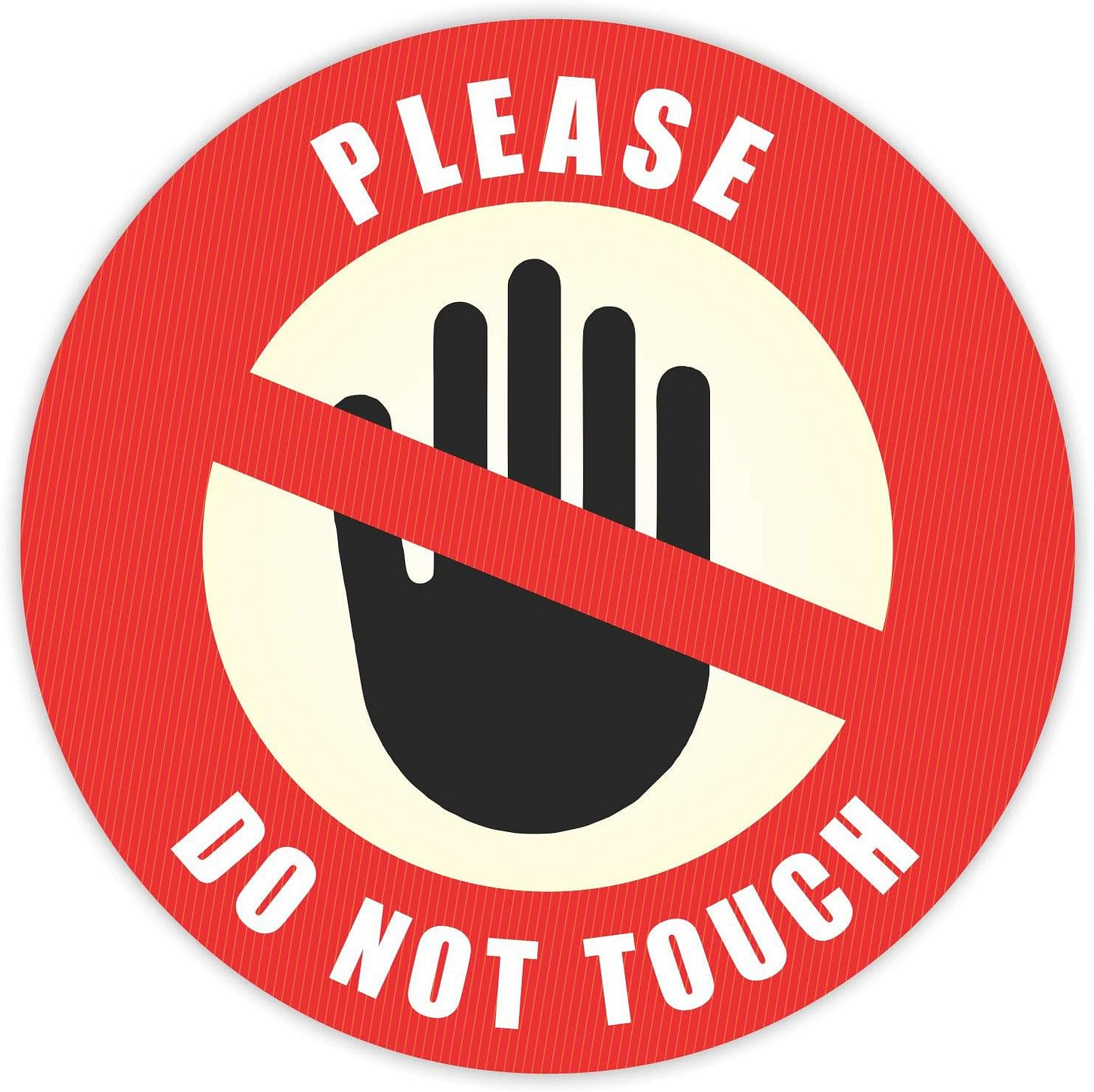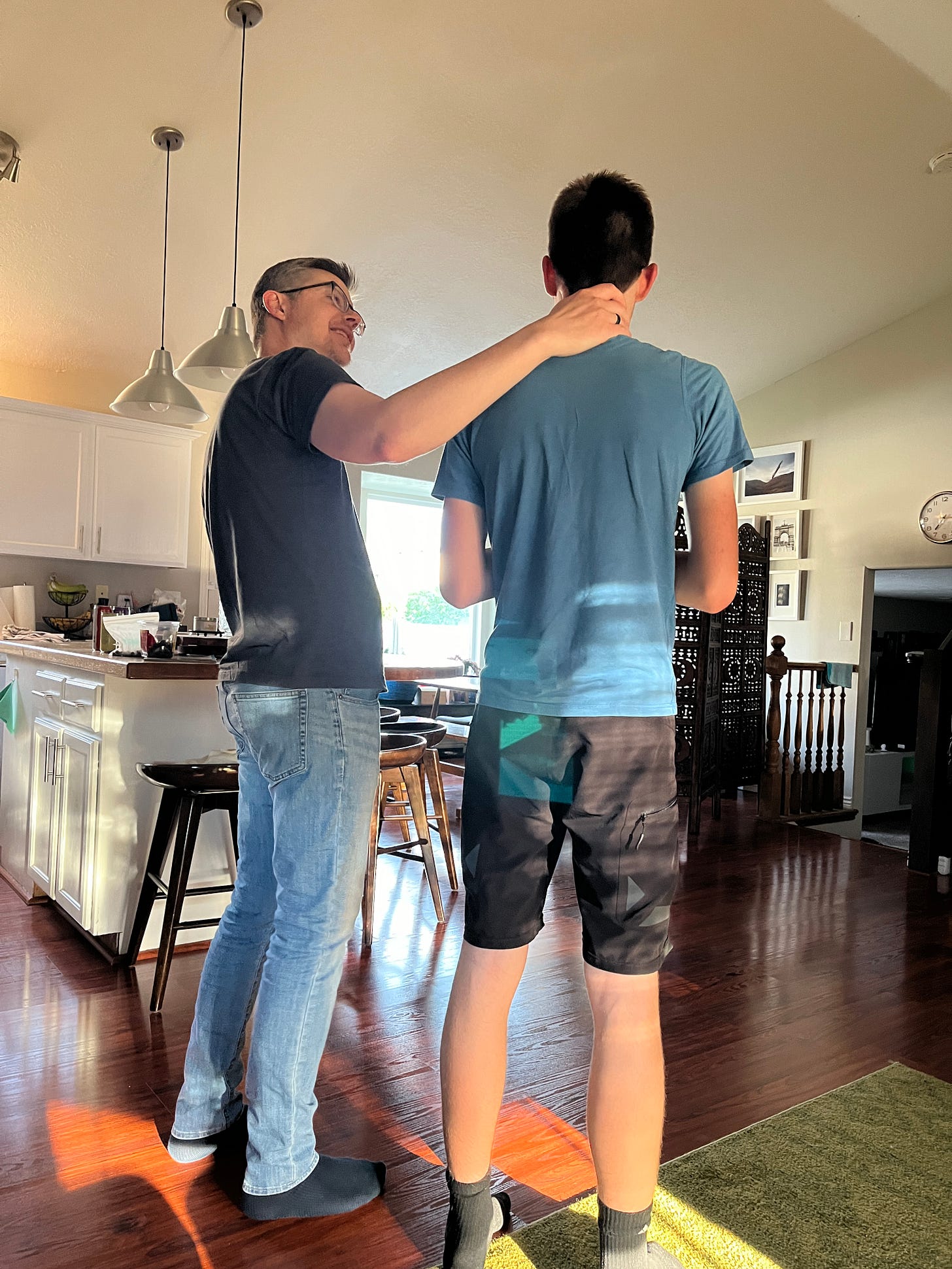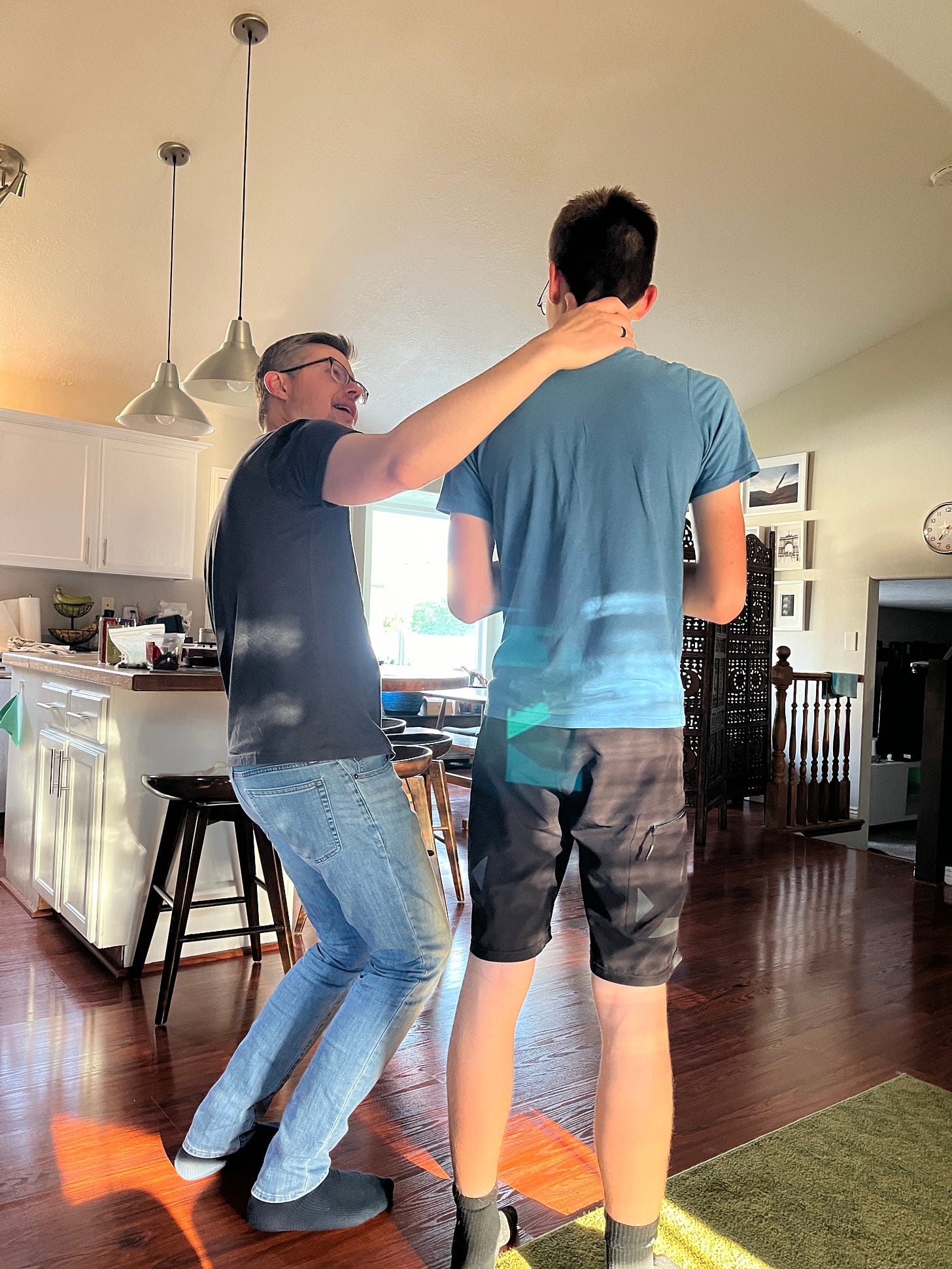
Sean and I have an ongoing conversation where we recount situations where we were part of uncomfortable, unsolicited physical contact, or witnessed it.
As a male, he said he experiences this almost never, but not completely never. As a female, I have experienced uncomfortable, unsolicited physical contact many, many times.
Sean adds, “Though, I have been told several times I have a sort of hands-off vibe. I’ll be in a group where people are hugging each other and to me they just give a wave—see ya!”
Watching him act that out is funny. But what is not funny or fun is unsolicited physical contact.
Maybe you’re like, “But Jen, I’m a hugger! But Jen, I’m just friendly! But Jen, I grew up in the old days! But Jen, I just like touching women!”
I don’t want to hear it. I feel it incumbent on me to deliver an important message on the subject and lend some help to the less-informed. I will describe how not to go about engaging girls and women and reasons why. I will be drawing from very real life personal experiences and observations and also take information from The Etiquette School of New York (ESNY) and to make it [even] more entertaining, I will include Sean.
Let me start off by saying this: Don’t touch girls, ever. Or women, or boys. But especially young girls. Just never. Don’t do it. No touching. Stop touching now. Hands off.
Let’s say you’re at church and you are an older gentleman (it doesn’t really matter what you are, but the gender/age discrepancy does matter) and you approach a young lady who you want to greet in some way. Greet her with words only, and not your hands:
a) clasped around the back of her neck
b) squeezing the back of her arm, sort of massaging it and not letting go for the duration of the conversation
c) massaging shoulders while she’s sitting, perhaps playing the piano, for instance
d) resting on her shoulder
e) touching her in any way
All of these are a sampling of what I’ve personally experienced.
Sean witnessed a man approach a young woman and hold her by the back of the neck while he spoke to her. He felt very uncomfortable watching it and I guarantee she felt even more uncomfortable enduring it.
I had Sean and Julian illustrate the neck grab Sean witnessed:
Julian’s response to this neck grab: “I feel threatened.”
Though I’m speaking about women and girls, I will add that this goes for boys too.
Being approached like this is extremely uncomfortable. This girl is not enjoying that, I promise. But also, she may not even be fully aware of it because girls are taught to never embarrass someone, or assert themselves in a way that might be an affront to someone else. We are taught to value politeness over our own physical discomfort and personal boundaries. We are taught, not to hurt feelings at absolutely any cost. We are NOT taught that we can say “no” or “stop” or “I don’t like that.” It might be considered rude. It is not rude. It’s a boundary. Boundaries are important. Respect them, applaud them, and teach them to your children.
Here’s another tip. If you are a close-talker and the person with whom you are speaking backs away, do not move closer to them. Notice the space they are making and respect it. Also, don’t approach them when they have nowhere to retreat, like up against a wall or in a corner. This feels really unpleasant. Give an appropriately wide berth.
Hugs
If you’re an adult male, you should never hug an underage girl you are not related to. This should go without saying but I’m attempting to be explicit here. Also, we should not require our children to hug anyone. “Go give them a hug.” Nah. Let them decide how they feel. Teach them they have a say.
Generally speaking, hugs can be tricky because it is indeed a sign of affection and friendship. But not everyone is a hugger. You might ask yourself if the nature of this relationship is such that a hug feels appropriate. Sometimes you don’t know. I know I don’t always. Even a non-hugger might be feeling huggy that day.
Here’s a helpful tip:
Ask.
”Can I give you a hug?”
”Is it alright if I give you a hug?”
”Say, should we hug?”
This is something I am working on. But if you think it’s weird to ask, it’s not. Respecting someone’s desire for hugging by asking is a process and takes practice. But it can be done. For instance, I have a teenager who helps me re-learn this lesson all the time.
Handshakes & Me
Let’s talk about handshakes.
The Etiquette School of New York says, “Historically men were not expected to shake hands with a woman. But today, everyone is expected to shake hands with everyone—in business. A man should give a woman the same firm handshake he gives a man. In social situations, however, a man should wait for a woman to extend her hand first. In Europe, a man should wait for a woman to extend her hand in business as well as social situations.”
Sean says he was explicitly taught this, that the rule is you wait for a woman to first offer her hand. Many people I observe and interact with are apparently not familiar with this rule.
He says, “I was taught that when you meet a woman, you nod or smile or do something to greet them, you don’t thrust out your hand, obliging her to also stick her hand out. If she extends her hand, then that’s fine. And then of course you don’t squeeze it or linger, holding on for too long or any of those things.”
Do you see how easy it is for a man to take advantage of a woman in this seemingly innocuous moment? I am not against men at all. But I am against people being taken advantage. Remember: Sean has experienced uncomfortable, unsolicited physical contact almost never. Me: a LOT.
I personally love this rule of the man waiting for the woman to extend her hand first. I wish I experienced it more in my social circles. Ever since Covid came about I just decided I do not love shaking hands. Like, why? Why though. I don’t care for it. I don’t need to do that as a way to greet people. If I were making a business deal, then it might be different. If introductions or an official agreement were being made, fine. But not as a “hello.” Know what a better “hello” is than forcing a handshake? Just saying “hello.”
I am rarely desirous of a handshake. “You know what I could really go for right now?” No. It’s not like a milkshake. Yet—very much unlike a milkshake—I am often met with one that I don’t know what to do with. Sometimes I say, “no thanks” and sometimes I intentionally have my hands full in order to avoid it. Kind of how I liked rainy days when I lived in a big city because that meant I had an umbrella to shield me from people who took my visible face as an open invitation for unsolicited comments.
Some people are totally fine with a “no thanks” and roll on just fine or offer a fist or elbow. But there is often a strong undercurrent of cultural expectation. When a hand is extended, you take it. Right?
Recently I was faced with a handshake proposition and I had my hands full. The hand was extended for a while and I had to make a show in order to point out I literally had my hands full. Like, I felt pressured to do everything I could to free up my hand and receive the handshake because that’s the strong, traditionally cemented-in expectation. Hello, I’m holding out my hand, you must now take it. Aren’t you going to take it? No, I don’t think I will.
I did my best to subtly point out that my hands were full and that would logistically make shaking hands pretty difficult. But I also use it as a moment to invite a reflection on whether or not this really needs to happen. Just… can we think about it for a second? Let’s be thoughtful about this.
They finally noticed and adapted by doing a funny close-proximity wave instead, and that was a hundred times better. In my opinion, at church and any other social setting, if just saying “hi” feels too difficult, I would be ok with a close-proximity wave. Let’s try it out! At least for the flu season. It just seems to me that we don’t need all these germs being passed around.
Sometimes I resign to take their hand and it’s generally not a big deal but it does nothing to help me feel closer to a person, and definitely expedites the need to wash my hands.
Handshakes & Sean
Handshakes can carry a lot of subtext. A lot can be expressed in a handshake in all its varietals. One in particular is the aggressive, locked handshake.
Sean describes a recent encounter:
”An older man came up to me with his hand out. He was coming from a distance, taking several steps while holding his hand pointed at me. I shook his hand and he enclosed mine in the two-hand sandwich shake, where you cover their hand with your other hand. And he did that while he locked eyes with me and conducted a mini-interview. He wanted to know everything about me, asking question after question in an intense way. At one point I gave an answer that apparently caused him to completely lose interest, because he dropped my hand and left to interview someone else. I felt like he completed a kind of evaluation. He kept shaking my hand the entire time and wouldn’t let it go until he was finished with me. I did not enjoy that experience.”
He reflects, “I think the next time this happens to me, I’ll… wrestle them off? Slap their hand? Stomp on their foot? I don’t care how old you are. You aren’t permitted to hold my hand. It just feels disrespectful. I’m not anybody’s grandson.”
I asked him if he thought it was a way of establishing dominance.
”I don’t think it’s usually that. I think it’s a physical reflection of what their perception of a person is. As long as you’re playing into it, you’re accepting that place they’re putting you in, and you don’t have to do that. The young lady I saw with a man with his hand around her neck was being treated like a little girl. She’s seventeen, maybe? Would he have treated a man this way?”
I will remind, don’t touch little girls, either. I’m not kidding. Leave them alone.
Males vs Females
Interestingly, I must search the deep recesses of my mind to recollect times I’ve shaken hands with other women. I know it’s happened, but I honestly can’t recall any details.
What does that mean? Is this a male-dominated, dictated action? In the sphere I grew up in and the world I live in now, 99.999% of my handshakes are with men. Something to think about.
Sean ponders, “There’s sometimes an overcompensation that can happen with people, men and women. And it’s unbalanced. Someone extends a hand, they squeeze, someone’s squeezing harder. Maybe the other tries to match it. Maybe it starts to hurt. Like, this isn’t a contest. It comes off as any other social blindness. They don’t realize they’re coming on too strong. They think they’re doing something assertive and actually they’re being off-putting. That’s what I think it is.”
I maintain handshakes can be used as a power play. Maybe more between men. Would love to gather more data on this. Any men want to weigh in?
Tips for Handshaking
To aid you on your quest to be more considerate, here are some other handshaking rules taken from the ENYS (in bold) and also as given by Sean, both of which are solid:
never shake hands with your left hand in your pocket
always be standing when shaking hands
Sean’s rule: don’t shake hands when your hands are wet.
To that I said, “no doi.”
But he said, “But often what will happen is you’ll say, No, I can’t, my hand is wet. And the other person will say, oh it’s ok. The right answer is: I’m sorry, no.
This is perhaps why I come off as a person with a very ‘no hug’ vibe."make eye contact and smile warmly
Sean, do you lock eyes? Stare intensely?
”No you do not. Make eye contact and then break it off.”keep 18 inches between youself and the other person
at least! That is not much distance.flex your knees so they’re not locked. Step into a handshake
Sean, do you grab someone’s hand and pull them toward you?
”Only if you’re trying to start a fight.”Extend your hand with your hand vertically with your thumb up and your fingers out. Avoid palm down, which is dominance, or palm-up which is submissive.
What if a lady extends her hand with the palm down, like, ‘i’ll allow you to take my hand’?
”I’ll take a lady’s hand, sure. But I’ll grasp her fingers and do a little squeeze, not her whole hand.”
Do you kiss her hand?
”Only if she’s in a princess costume.”Don’t begin your handshake until you have connected web-to-web (the skin between thumb and forefinger) first.
That’s interesting. I think I’ve seen this before. It makes sense. What’s the alternative, fingers touching first and then rapid crawling to position?Sean says, “There are times when you’re just holding fingers, like you’re not all the way in yet. And that’s weird.”
So, webs first, people.Squeeze until you feel their muscles tighten, and then stop. Match the other person’s grip.
”And then stop.” So simple, yet so difficult for some.
Sean, should you clamp down so they can’t get out of the handshake?
”Only if you want to be slapped. Maybe that’s what that left hand is for. It’s not in your pocket because it’s poised and ready.”
What’s the Big Deal?
Maybe you’re thinking, Geez, Jen. Why are you making such a big deal out of this? Well I’ll tell you.
What this expectation, what taking this liberty teaches people is, “Your body is not yours, it’s also a little bit mine too.” When someone invades this, you feel trapped, paralyzed even, and your freedom to handle your body in the way that you wish has been compromised. It is now, quite literally, in the hands of someone else. Do not put people in this position. Your intentions might be good but good intentions can still have negative effects.
Since women are taught as girls that their body does not belong to them, they grow up tolerating being touched in various ways. If they did not learn as children that it is OK to establish physical boundaries, when will they? Or maybe a better question is: How will they? What will the circumstances be? Many wonderful people in the world are trustworthy. Many are not. Many will push to see what they can get away with. The longer we let behaviors happen, the more difficult it is to see anything negative about them.
Age and gender matter because we’re taught to respect our elders, especially if they’re men. At church, they’re exclusively so. We are expected to tolerate things from them we might not from someone else. But we don’t have to. If you fit this profile, please take my words as the helpful information they are intended to be and be more thoughtful about your behavior.
I’m at the point where I kind of feel like I need to walk around and remind people not to do this, like Lucille Ball did during a talk show when the host kept touching women in the audience. See the video here:
Notice how his position of power or privilege seems to give him permission to touch these women. It does not. Notice how he laughs. Notice how the women laugh. Notice how Lucille does not laugh. If this doesn’t seem like an issue to you, or feels overboard, ask yourself- why? Why could it be an issue for Lucille and not for you? Maybe you have different experiences. Maybe you’re so accustomed to it being the norm, you’ve never thought to question it. This goes for both men and women. I encourage you to question it now.
In conclusion
I don’t hate all handshakes. And I don’t never touch people (←best sentence I’ve ever written). My main goal here is to remind anyone out there who might need it (men) to not force handshakes and to stop. touching. girls. Do not teach girls that if a hand is extended to them, they must take it, that that is the expectation. Do not teach them that if a hand is placed anywhere on them, they must tolerate it. Teach instead, they have full bodily autonomy, the right to make decisions about one’s body without coercion or violence, and empower them to communicate those boundaries.
For example, teach them that “No” is a complete sentence. We often think we need to explain our reasons and over-apologize for things. Nope. A simple “no” is enough. Try it yourself the next time you feel pressured to engage in something you don’t want to. I will too.
My personal request: If we’re not pals, please don’t caress me while we’re talking. Please don’t rest your body parts onto mine during conversation. Greet women and girls with your words— say something friendly, maybe even smart or interesting. If you’re genuine, non-threatening and respect the space we’re in, I think we’ll all do very well.




Was I a part of said conversation? 😉